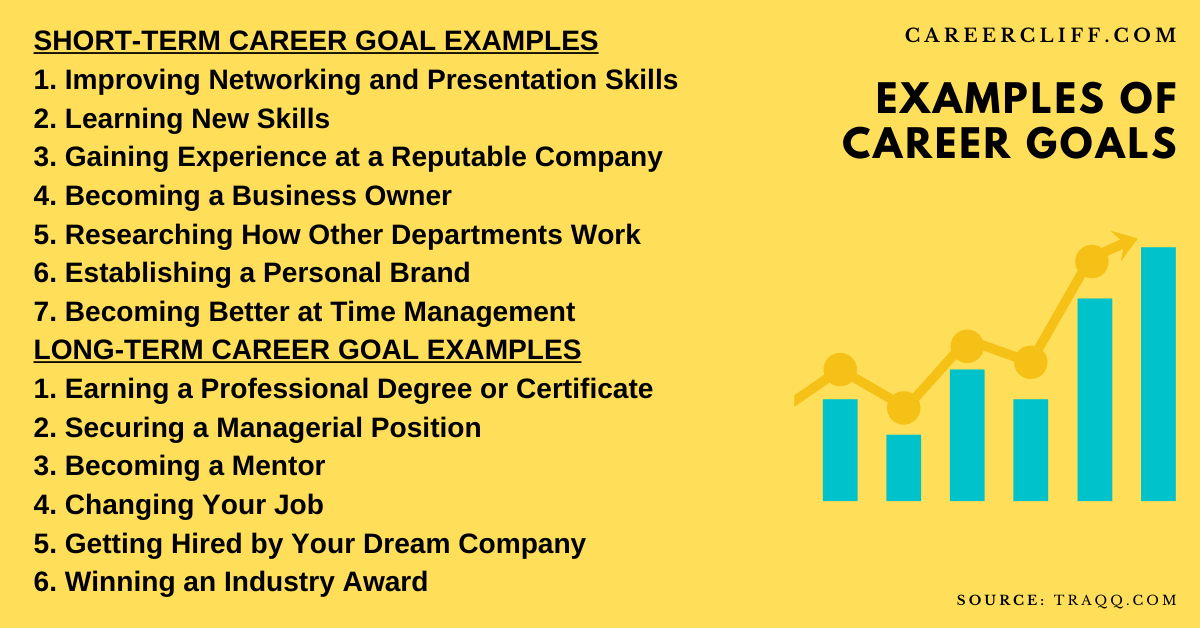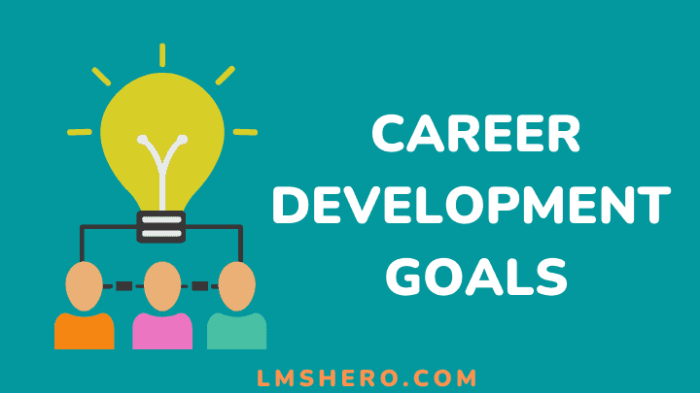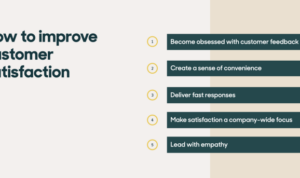Career Development Goals are the roadmap to success, guiding individuals towards their professional aspirations with purpose and determination. From setting clear objectives to overcoming obstacles, this journey is filled with inspiration and growth.
Exploring the different facets of goal setting and personal development, this narrative unravels the key elements that shape a fulfilling career path.
Importance of Career Development Goals

Setting career development goals is crucial for professional growth as it provides individuals with a clear direction and purpose in their careers. By outlining specific objectives, individuals can focus on what they want to achieve and create a roadmap to reach their desired outcomes.
Having clear career development goals can help individuals stay motivated and focused in their careers. When individuals have a clear vision of where they want to go, they are more likely to take consistent action towards achieving their goals. This sense of purpose can drive individuals to overcome obstacles, stay resilient in the face of challenges, and maintain a positive attitude towards their professional development.
Successful professionals often attribute their achievements to setting and achieving career goals. For example, Elon Musk, the CEO of Tesla and SpaceX, set ambitious goals for himself early in his career, such as revolutionizing the electric car industry and colonizing Mars. By setting these audacious goals and working tirelessly towards them, Musk has become one of the most influential entrepreneurs of our time.
Examples of Successful Professionals
- Sheryl Sandberg: The COO of Facebook set career goals to advance her leadership skills and empower women in the workplace, leading her to become a prominent figure in the tech industry.
- Oprah Winfrey: The media mogul set career goals to build her own empire and create a platform for inspiring and empowering others, resulting in her massive success in television and media.
- Jeff Bezos: The founder of Amazon set career goals to revolutionize e-commerce and expand into various industries, propelling him to become one of the wealthiest individuals in the world.
Types of Career Development Goals
In the pursuit of a successful career, individuals often set various types of career development goals to guide them towards their desired outcomes.
Skill-Based Goals
Skill-based goals focus on acquiring or enhancing specific skills that are necessary for success in a particular field. These goals may include improving communication skills, mastering a new software program, or obtaining a certification in a relevant area.
Performance-Based Goals
Performance-based goals are centered around achieving specific outcomes or targets within a given timeframe. Examples of performance-based goals could be increasing sales by a certain percentage, completing a project ahead of schedule, or receiving positive feedback from clients.
Promotion-Based Goals
Promotion-based goals are aimed at advancing to a higher position within an organization or industry. These goals may involve gaining additional qualifications, taking on leadership roles, or demonstrating exceptional performance to be considered for a promotion.
Short-Term vs. Long-Term Goals
Short-term career goals are typically achievable within a year or less and serve as stepping stones towards long-term objectives. For example, a short-term goal could be completing a professional development course to improve a specific skill. Long-term career goals, on the other hand, are broader objectives that may take several years to accomplish, such as reaching a senior management position or starting a successful business.
Aligning Personal Values and Interests
It is crucial to align personal values and interests with career development goals to ensure a fulfilling career path. When individuals pursue goals that resonate with their values and passions, they are more likely to experience satisfaction and fulfillment in their work. This alignment can also lead to greater motivation, productivity, and overall success in achieving career milestones.
Strategies for Setting Effective Career Development Goals

Setting effective career development goals is crucial for success in your professional journey. By following specific strategies, such as the SMART criteria, breaking down long-term goals, and seeking mentorship and feedback, you can enhance your career growth and achieve your aspirations.
SMART Criteria for Goal Setting
The SMART criteria stand for Specific, Measurable, Achievable, Relevant, and Time-bound. When setting career development goals, make sure they are specific and clearly defined. Ensure they are measurable, so you can track your progress. Set goals that are achievable and realistic within your capabilities. Make sure they are relevant to your overall career objectives. Lastly, set a timeline for each goal to keep yourself accountable and motivated.
Breaking Down Long-Term Goals
Long-term career goals can seem daunting, but breaking them down into smaller, achievable milestones can make them more manageable. Start by identifying the steps needed to reach your long-term goal and setting deadlines for each milestone. By focusing on one milestone at a time, you can maintain momentum and stay on track towards your ultimate objective.
Role of Mentorship and Feedback
Mentorship and feedback play a vital role in refining and adjusting your career development goals over time. Seek guidance from experienced professionals in your field who can provide valuable insights and advice. Regular feedback from mentors, supervisors, or peers can help you assess your progress, identify areas for improvement, and make necessary adjustments to your goals. Embrace constructive criticism as an opportunity for growth and refinement in your career journey.
Overcoming Challenges in Achieving Career Development Goals
Achieving career development goals can be a challenging journey filled with obstacles that may hinder progress. It is crucial to identify these common challenges and develop strategies to overcome them in order to reach your desired career milestones.
Identifying Common Obstacles
- Lack of clear direction: Uncertainty about career goals can lead to confusion and indecision. To overcome this, take the time to reflect on your values, interests, and skills to determine a clear path forward.
- External barriers: Factors such as financial constraints, lack of resources, or limited opportunities may pose challenges. Seek out support systems, network with professionals in your field, and explore alternative options to navigate around these barriers.
- Procrastination and self-doubt: Negative thoughts and procrastination can impede progress. Practice self-discipline, set achievable deadlines, and focus on building self-confidence to overcome these mental obstacles.
Importance of Resilience and Adaptability
Resilience and adaptability are essential qualities to cultivate when facing setbacks or unexpected changes in your career development journey. Being resilient allows you to bounce back from failures, while adaptability enables you to adjust to new circumstances and seize opportunities for growth.
Success Stories of Overcoming Challenges, Career Development Goals
“I faced numerous rejections before landing my dream job, but I persisted and improved my skills through continuous learning. This resilience ultimately paid off and led me to success in my career.” – Sarah, Marketing Manager
“When the pandemic hit and I lost my job, I took the opportunity to explore new industries and enhance my skill set. Adapting to the changing landscape helped me secure a better position than before.” – John, Business Analyst






